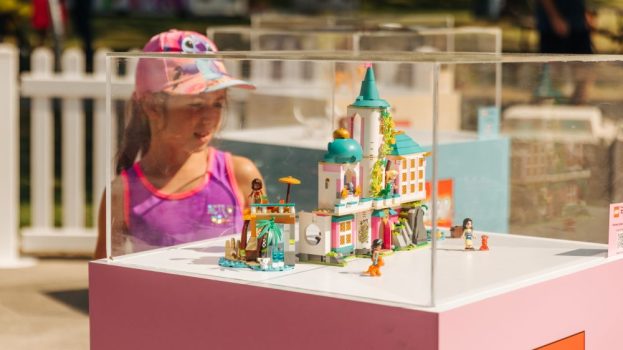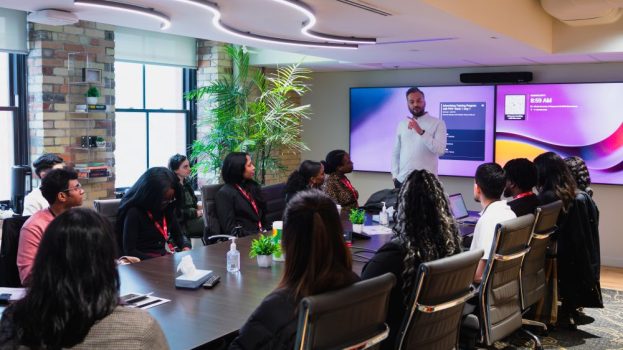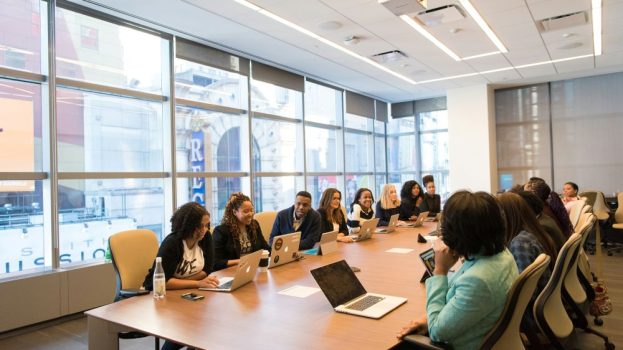
This is an instalment in a series of profiles on Canada’s commercial production sector – and more specifically, on BIPOC-led companies and organizations that are working to improve diversity and representation in front of and behind the camera. You can also read the first instalment on industry non-profit POV Film as well as profiles on BIPOC owned and operated production companies Fela and Pique.
The onset of the COVID-19 pandemic was nearly a breaking point for Toronto-based production company Alfredo Films.
The company’s co-founders – EPs Alex Henry and Holly Rowden, along with CD Shivam Pandya – were burning the candle at both ends. They were holding down part-time work while simultaneously running a production company that had been having difficulty getting its foot in the door with some agencies, while also dealing with heavy overhead for an office that, basically, was a “glorified fitting room,” according to Henry.
 The trio had entered the industry in 2017, with few connections and no idea how to run a business. At that time, in an industry that is very insular and driven by whom knows whom, they had a hard time making contacts, Henry (pictured, right) says.
The trio had entered the industry in 2017, with few connections and no idea how to run a business. At that time, in an industry that is very insular and driven by whom knows whom, they had a hard time making contacts, Henry (pictured, right) says.
“We were breaking into a market in which we had no connections,” adds Pandya. “We had to develop and learn by hitting up new people, asking them questions, having some doors closed on us and, eventually, meeting people who did show us how to do things. We didn’t have a support system. We had to build that from the ground up.”
Alfredo hired someone to be its “face” and help them land meetings and earn opportunities to pitch.
“As young and diverse as we were, we thought people wouldn’t take us as seriously. So we did that for a year, and that person did a good job helping us better understand the industry, but ultimately, that wasn’t us,” Henry tells strategy. “We needed to change the narrative.”
Then – almost overnight – the world changed. The pandemic began and initially the trio found themselves drifting apart and losing their focus on Alfredo. But circumstances in their personal and professional lives changed, which gave all three more time and drive to focus on their personal project. They were also working from home, so they gave up on their office space – a move that helped them save a lot of money, Rowden notes. And Henry said that everyone being at home suddenly gave people more time for meetings they previously weren’t able to take.
“We stopped talking to each other, and I guess we thought it was over. But our mentor hit us up and told us that this was the time to make moves,” Henry tells strategy. “Every few decades, something happens in the world and markets change, he told us. That kicked us in the butt. So the next day, we went on LinkedIn and started building a database of everyone we needed to hit up – and then we took time reaching out to all of them and asking them for 10 minutes for a conversation and we could take it from there.”
Though it was still difficult to find a seat at some tables, the trio were able to make contact with mentors in the industry that assisted them. Veteran producer Sharon Nelson-Bailey is the first name on all of their lists.
“Without her, we wouldn’t have been a part of the Black Elevation Map, which is a project that has won a Cannes Lion,” explains Henry.
 On a more personal level, “I have no hesitation calling her up and asking a dumb question,” adds Rowden (pictured, left).
On a more personal level, “I have no hesitation calling her up and asking a dumb question,” adds Rowden (pictured, left).
They are also quick to point to others who have helped them out. Ben Tarr, president of Leo Burnett, opened the door to that agency’s pitching process, which gave Alfredo to chance to compete for work there. Jacqueline Bellmore – who, at the time, led production at McCann – also earned a tip of the cap for helping Alfredo in a similar fashion.
“It wasn’t a handout, but a chance to be good at what we could do,” says Rowden.
With McCann, Alfredo has worked on four different projects, including MasterCard’s True Name campaign, an effort that sought to recognize transgender Canadians by their chosen name on their credit cards, instead of their deadnames. The project was one that spoke to values held at the core of the production company, says Pandya (pictured, right).
“Anything that deals with representation of different communities that are not in mainstream media, we are always on top of that, and we feel deeply for that work,” he elaborates. “We try to win jobs like that, which really align with our values.”
The same is true of the company’s pro bono efforts. While Alfredo has been approached by larger brands with high chances of awards success, Rowden says, it instead opts to donate its time to smaller organizations that are doing “real good.”
Looking back on the past few years, the trio are “very proud of what we’ve accomplished,” Henry says.
“In the industry, there’s not a lot of people who look like us, are our age or are as diverse as us. But we don’t lean on it,” he explains. “We try to let our work speak for itself. We don’t want to be categorized as just a BIPOC or diverse company, even though our unconventional journey has brought us to where we are. We want to get to a place where, when we’re on set, it’s just naturally diverse. But that won’t happen overnight.”
“This is an industry that has a lot of change still to do,” Henry adds. “But we’re going to carve out our space within it, and all of the rest will follow.”























